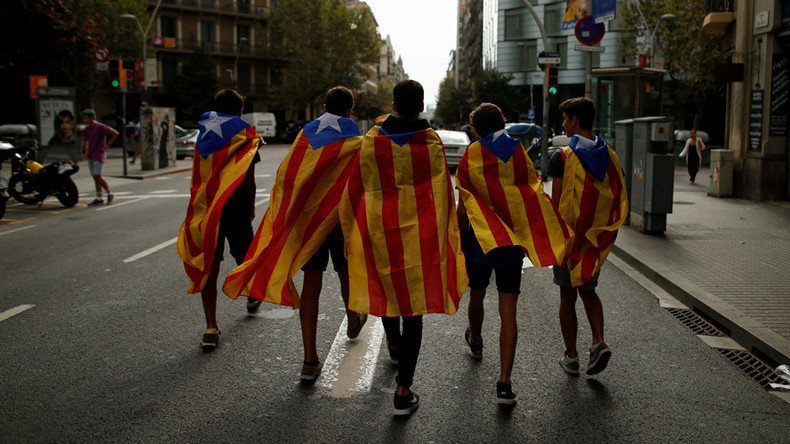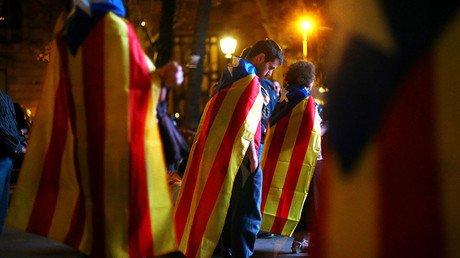Catalan quandary: No big national power supports its independence – analyst

Spain will continue to maintain its course as is: an illegal process the Catalonian regional government has unilaterally embarked on, the international affairs commentator Marco Gasic told RT.
The President of Catalonia Carles Puigdemont has until Thursday to definitively state whether the region is going ahead with trying to break away from Spain.
A deadline set by Madrid for a 'yes' or no' answer elapsed earlier on Monday.
However, the Catalonian leader refused to clarify his position on the matter.
Monday's deadline was imposed after the region conducted a disputed referendum a fortnight ago, in which the majority of voters wanted to break away.
RT: Why do you think the Catalonian president didn't clear things up today?
Marco Gasic: I think Mr. Puigdemont is perfectly aware that the referendum he organized on his own behalf has insufficient legitimacy, even if we take it at face value because 90 percent of 43 percent means 38.7 percent by my reckoning, which is just over one-third voting for independence. We really know that those who didn’t turn out are probably those who opposed the referendum, as well as the independence it was requesting. So really, he hasn’t got a mandate even to ask for independence on its own merits.
The other thing that he hasn’t got is control over Catalonia, and that is one of the key determinants, whether countries do get recognized, is whether they actually have control over the territory to which they lay claim. In this case, in Catalonia’s case, the Catalonian government has got no control over that in effect, because Spain is still very much in control over its own territory in Catalonia.
RT: What will happen by Thursday, do you think?
MG: I think they’ll just be shadowboxing till Thursday. He will say: "We do not believe Madrid has the right to tell us to meet its deadlines, we are independent, and so on, and so forth, of Madrid. Therefore, we won’t be listening to Madrid." And that way he will buy himself more time and hope for some other solutions to turn up. But it is a difficult situation for him because he can’t roll back very far without committing political suicide, in fact, becoming a lame duck president of his regional government.
RT:How will Madrid react if there's no clear answer on Thursday?
MG: The Spanish government will continue to maintain its position, which is that any such cessation is illegal, even according to the Catalans themselves, who in 1978 voted 90 percent, that is to say an overwhelming number of their voters voted in support of the Spanish constitution, which declared that Catalonia was an indissoluble part of Spain. So Spain will continue to maintain its course that is as it is: an illegal process that the Catalonian regional government is unilaterally embarked on.
We should bear in mind that in fact, the problem for Catalonia is that for any kind of illegal cessations to work, you need to have a big power, usually a Western country, wanting to break up your country for some reason. For example, in the case of Yugoslavia – you had Croatia and Slovenia who were supported by Germany and Austria, and later we found Bosnia and Kosovo being sponsored by the USA. In the case of Catalonia, there is nobody to support it – no big power to support its bid to break away from Spain, and that is probably better for everybody.
RT: Do you expect the two sides to talk and perhaps more autonomy to be given to Catalonia eventually?
MG: I think Spain has to be very sensitive to the mood in Catalonia. But part of that mood is caused by things like the financial crisis in 2009 when the housing bubble in Spain burst. That was effectively blamed by the regional Catalan authorities on Madrid. So there is a kind of financial element to the discontent in Catalonia, which has certainly made it worse.
The point is that with the movement of capital, of banks, of company headquarters away from Catalonia now into a definite EU location, which is the rest of Spain, Catalonians face the danger of moving from being one of the richest parts of Spain to being one of the poorest parts of Europe. They do really need to consider where they are heading with this unilateral project devised by some of them.













